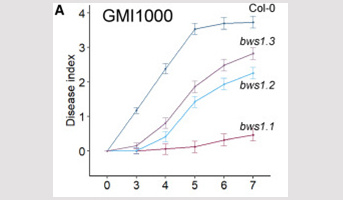BWS1, an atypical resistance gene in Arabidopsis, with an unexpected role in bacterial wilt establishment
The use of resistant cultivars has emerged as the most economical and sustainable method of countering the damaging effect of the pathogenic bacterium Ralstonia solanacearum, responsible for bacterial wilt. This resistance is recognized as being mainly polygenic, involving several genes to contribute to quantitative resistance. LIPME's ECOGEN team, in collaboration with the "Senescence, Autophagy, Nutrient Recycling and Nitrogen Use Efficiency" SATURNE team and the Shanghai Center for Plant Stress Biology, has developed an interdisciplinary approach, involving microbial genetics, quantitative genetics, molecular biology and biochemistry, and is producing innovative results through the use of bacterial mutants and Arabidopsis accessions.
Discoveries include:
> the identification of major virulence factors,
> the development of innovative association genetics methods,
> the discovery of an atypical resistance gene (BWS1) which contributes to the development of the disease
> and the functional characterization of this susceptibility gene.
This work, at the heart of the issues addressed by the INRAE SPE and BAP departments, demonstrates that innovative association genetics approaches on Arabidopsis can reveal new sources of resistance, paving the way for future applications on plants of agronomic interest such as tomato.
Research developed at the Institute Jean-Pierre Bourgin for Plant Sciences
Back

Legend: Disease symptom dynamics of A. thaliana bws mutants in response to Ralstonia solanacearum strain GMI1000
INRAE SPE division Highligh
"Senescence, Autophagy, Nutrient Recycling and Nitrogen Use Efficiency" SATURNE
Associated publication:
C Demirjian, N Razavi, G Yu, B Mayjonade, L Zhang, F Lonjon, F Chardon, S Carrere, J Gouzy, S Genin, A P Macho, F Roux, R Berthomé, F Vailleau.(2023). An atypical NLR gene confers bacterial wilt susceptibility in Arabidopsis. Plant Commun. 4
doi: https://doi.org/10.1016/j.xplc.2023.100607